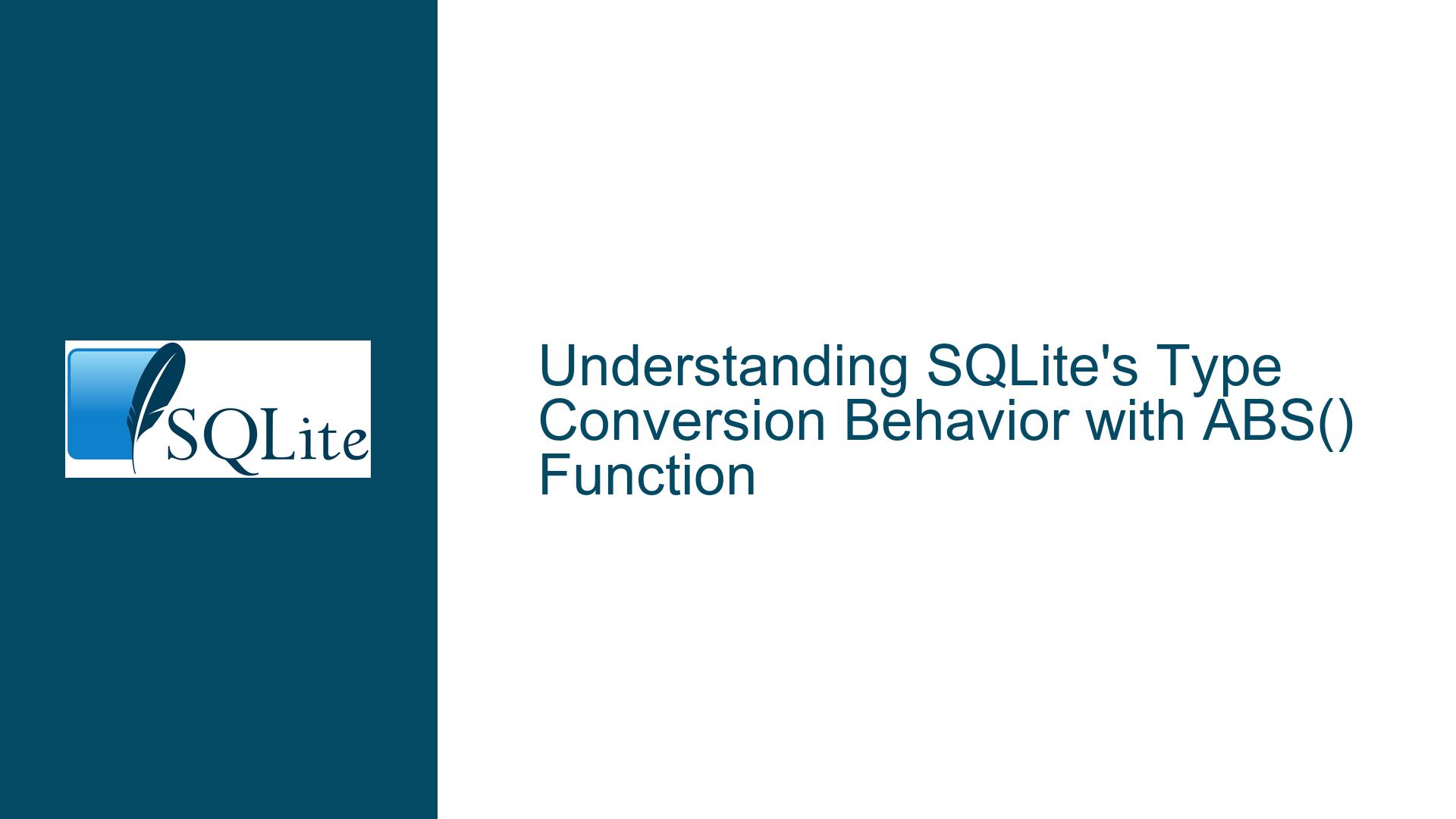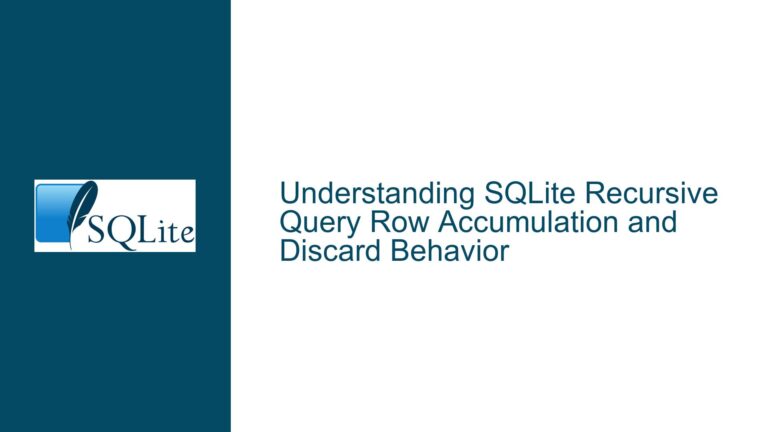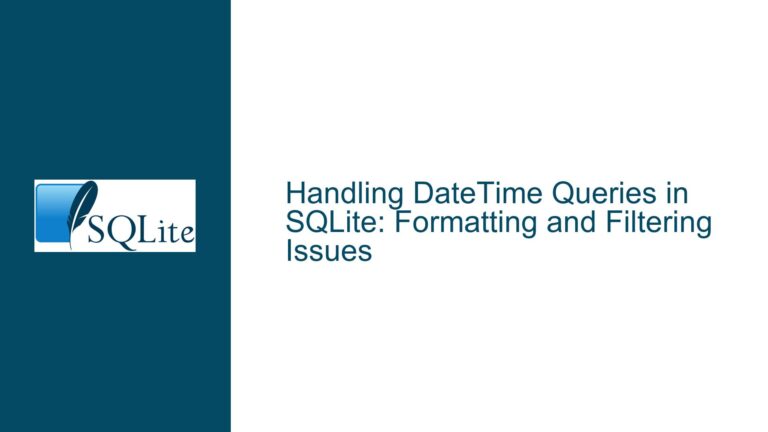SQLite’s Type Conversion Behavior with ABS() Function
Issue Overview: Why ‘0’ and ‘0.0’ Are Treated as Strings or BLOBs in SQLite
The core issue revolves around SQLite’s handling of type conversion, particularly when dealing with the ABS() function. The ABS() function, which calculates the absolute value of a numeric input, exhibits unexpected behavior when passed string representations of numbers such as '0' and '0.0'. Instead of converting these strings to their numeric equivalents, SQLite treats them as strings or BLOBs, resulting in a return value of 0.0 instead of the expected integer or real number.
This behavior is documented in SQLite’s official documentation, which states that ABS(X) returns 0.0 if X is a string or BLOB that cannot be converted to a numeric value. However, the confusion arises because '0' and '0.0' are valid numeric representations, yet they are not automatically converted to their numeric forms when passed to ABS(). This raises questions about SQLite’s type affinity rules, implicit type conversion, and how the ABS() function processes its input.
To further complicate matters, the behavior changes when arithmetic operations are introduced. For example, adding 0 to a string representation of a number forces SQLite to perform an implicit type conversion, resulting in the correct numeric type being inferred. This inconsistency highlights the nuances of SQLite’s type system and the importance of understanding how and when type conversions occur.
Possible Causes: Type Affinity, Implicit Conversion, and ABS() Function Behavior
The behavior observed with the ABS() function can be attributed to several factors, including SQLite’s type affinity system, implicit type conversion rules, and the specific implementation of the ABS() function.
Type Affinity in SQLite:
SQLite uses a dynamic type system where the type of a value is associated with the value itself, not the column in which it is stored. This is different from most other SQL databases, which enforce strict typing rules at the column level. SQLite’s type affinity system influences how values are stored and retrieved but does not enforce strict type constraints. When a value is inserted into a column, SQLite attempts to convert it to the column’s declared type affinity (e.g., INTEGER, REAL, TEXT, BLOB, or NUMERIC). However, this conversion is not always straightforward, especially when dealing with string representations of numbers.
Implicit Type Conversion:
SQLite performs implicit type conversion in certain contexts, such as arithmetic operations. For example, when a string is used in an arithmetic expression (e.g., '0' + 0), SQLite attempts to convert the string to a numeric type. This conversion is based on the content of the string and its ability to be interpreted as a number. However, this conversion is not always applied consistently across all functions and operations. The ABS() function, for instance, does not implicitly convert string inputs to numeric types unless explicitly instructed to do so.
ABS() Function Implementation:
The ABS() function is designed to operate on numeric inputs. When given a non-numeric input, such as a string or BLOB, it attempts to convert the input to a numeric value. If the conversion fails, the function returns 0.0. This behavior is documented but can be counterintuitive when dealing with string representations of numbers like '0' and '0.0'. The function’s implementation does not perform the same implicit conversion as arithmetic operations, leading to the observed discrepancy.
Loss of Information During Conversion:
Another factor contributing to this behavior is the potential loss of information during type conversion. For example, the string '0.0' contains more information than the numeric value 0.0 because it explicitly indicates a real number with one decimal place. When SQLite converts '0.0' to a numeric value, it loses this additional information. SQLite’s type system recognizes this loss and may choose to treat the value as a string to preserve the original information. This explains why '0.0' is not automatically converted to a numeric value when passed to the ABS() function.
Troubleshooting Steps, Solutions & Fixes: Ensuring Proper Type Conversion in SQLite
To address the issue of '0' and '0.0' being treated as strings or BLOBs in SQLite, it is essential to understand and control the type conversion process. Below are detailed steps and solutions to ensure proper type handling when working with the ABS() function and similar scenarios.
1. Explicit Type Conversion:
The most straightforward solution is to explicitly convert string representations of numbers to their numeric equivalents before passing them to the ABS() function. This can be achieved using SQLite’s CAST or + 0 trick.
Using CAST:
TheCASTfunction allows you to explicitly convert a value to a specific type. For example:SELECT ABS(CAST('0' AS INTEGER)), ABS(CAST('0.0' AS REAL));This ensures that the string
'0'is converted to an integer and'0.0'is converted to a real number before being passed toABS().Using + 0:
Adding0to a string forces SQLite to perform an implicit type conversion. For example:SELECT ABS('0' + 0), ABS('0.0' + 0);This approach is less explicit but achieves the same result by leveraging SQLite’s implicit conversion rules.
2. Understanding Type Affinity in Table Definitions:
When storing data in tables, SQLite’s type affinity system can influence how values are handled. By defining columns with appropriate type affinities, you can ensure that values are stored and retrieved in the desired format.
Defining Numeric Columns:
If you expect a column to store numeric values, define it with theINTEGERorREALtype affinity. For example:CREATE TABLE numbers (id INTEGER, value REAL);This ensures that any value inserted into the
valuecolumn is treated as a real number, even if it is provided as a string.Inserting Values with Explicit Types:
When inserting values into a table, use explicit type conversion to ensure the correct type affinity is applied. For example:INSERT INTO numbers (id, value) VALUES (1, CAST('0.0' AS REAL));This guarantees that the string
'0.0'is stored as a real number.
3. Handling Edge Cases and Non-Numeric Inputs:
When working with user-provided data or external sources, it is essential to handle edge cases and non-numeric inputs gracefully. This includes validating inputs and providing fallback values when conversion fails.
Validating Inputs:
Use SQLite’stypeof()function to check the type of a value before processing it. For example:SELECT val, CASE WHEN typeof(val) = 'text' THEN ABS(CAST(val AS REAL)) ELSE ABS(val) END AS abs_val FROM tbl;This ensures that string inputs are explicitly converted to numeric values before being passed to
ABS().Providing Fallback Values:
Use SQLite’sCOALESCE()function to provide a fallback value when type conversion fails. For example:SELECT val, COALESCE(ABS(CAST(val AS REAL)), 0) AS abs_val FROM tbl;This ensures that the query returns a valid numeric value even if the input cannot be converted.
4. Leveraging SQLite’s Type Conversion Functions:
SQLite provides several functions that can assist with type conversion and handling. These functions can be used to ensure that values are processed correctly.
Using
CAST()andROUND():
TheCAST()function can be combined withROUND()to handle specific numeric formats. For example:SELECT ABS(ROUND(CAST('0.0' AS REAL), 1));This ensures that the string
'0.0'is converted to a real number and rounded to one decimal place before being passed toABS().Using
IFNULL()andNULLIF():
TheIFNULL()andNULLIF()functions can be used to handle null values and edge cases. For example:SELECT ABS(IFNULL(CAST(val AS REAL), 0)) AS abs_val FROM tbl;This ensures that null values are replaced with
0before being passed toABS().
5. Debugging and Testing Type Conversion:
To ensure that your queries handle type conversion correctly, it is essential to test and debug them thoroughly. This includes examining the types of values at each step of the query and verifying the results.
Using
typeof()to Debug Queries:
Thetypeof()function can be used to inspect the type of a value at any point in a query. For example:SELECT val, typeof(val), ABS(val), typeof(ABS(val)) FROM tbl;This provides insight into how SQLite is handling type conversion and allows you to identify any discrepancies.
Testing with Sample Data:
Create a test table with sample data that includes various types of inputs, including strings, integers, real numbers, and null values. For example:CREATE TABLE test (val TEXT); INSERT INTO test (val) VALUES ('0'), ('0.0'), ('char'), ('-12'), ('5'), (NULL);Use this table to test your queries and verify that they handle all cases correctly.
6. Best Practices for Working with SQLite’s Type System:
To avoid issues with type conversion, it is essential to follow best practices when working with SQLite’s type system. These practices include using explicit type conversion, defining appropriate type affinities, and validating inputs.
Use Explicit Type Conversion:
Always use explicit type conversion when working with values that may be stored as strings. This ensures that the values are processed correctly and avoids unexpected behavior.Define Appropriate Type Affinities:
When creating tables, define columns with the appropriate type affinities to ensure that values are stored and retrieved in the desired format.Validate Inputs:
Validate inputs to ensure that they are in the expected format before processing them. This includes checking the type of the value and providing fallback values when necessary.Test Thoroughly:
Test your queries with a variety of inputs, including edge cases and non-numeric values, to ensure that they handle all scenarios correctly.
By following these steps and solutions, you can ensure that SQLite handles type conversion correctly and avoid issues with the ABS() function and similar scenarios. Understanding SQLite’s type system and how it interacts with functions and operations is key to writing robust and reliable queries.






